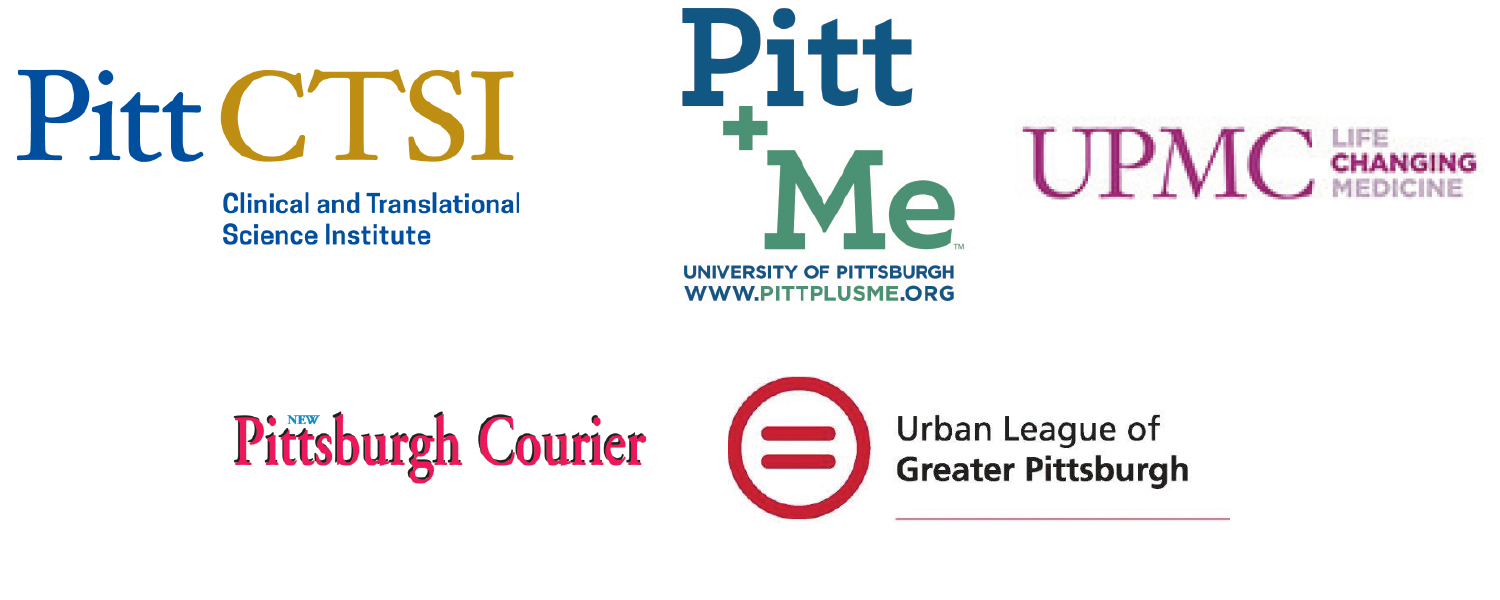(LEFT TO RIGHT) TINA NDOH, SALLY WENZEL, TIFFANY GARY-WEBB, JEANINE BUCHANICH, AND DARA MENDEZ, FACULTY FROM PITT’S SCHOOL OF PUBLIC HEALTH
May 9-11 was Pittsburgh’s first Environmental Justice Summit with the theme Reflections, Connections, and Collaborative Action. Attendees included community partners on the forefront of environmental initiatives, as well as practitioners, academics, researchers, and other advocates.
The event celebrated the good work that’s being done to promote environmental justice in our region. It also brought together different groups to meet, network, listen, and brainstorm a collaborative way forward.
The summit’s goal was to kick off a collective force of people who will work together to eliminate environmental health disparities caused by air and water pollution, chemical waste, climate change, and lead exposure.
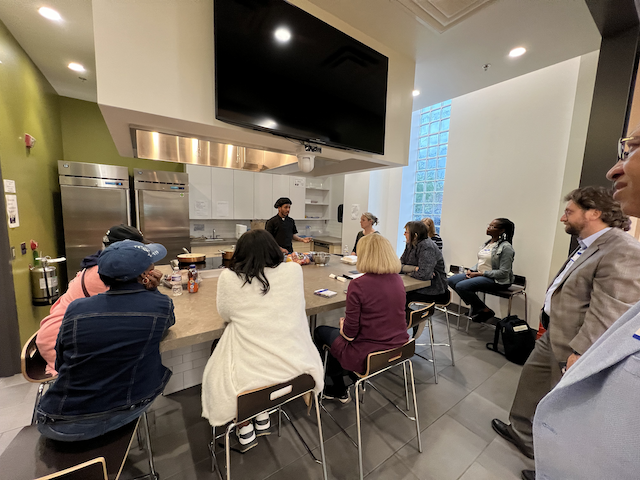
ON FRIDAY EVENING, FEED THE HOOD’S CHEF CARLOS THOMAS HOLDS A COOKING DEMONSTRATION.
The summit was created, planned, and co-chaired by Dr. Tina Ndoh, Pitt Associate Professor of Environmental and Occupational Health in the School of Public Health and Dani Wilson, Executive Director of the Cancer & Environmental Network of SWPA.
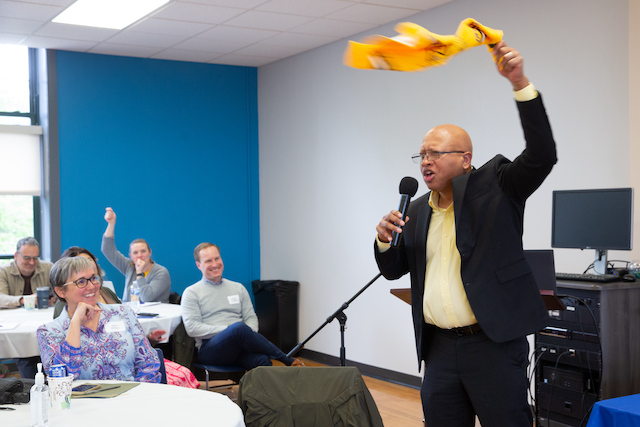
KEYNOTE SPEAKER (AND STEELERS FAN) SACOBY WILSON, FACULTY, UNIVERSITY OF MARYLAND, COLLEGE PARK
What is environmental justice?
Environmental justice is the fair treatment and involvement of all people in making and enforcing environmental laws, regulations, and policies in the natural and built environment. The movement promotes a healthier society regardless of color, race, income, or national origin.
In Pittsburgh, like many other parts of the country, Black and Brown communities are exposed to more pollution than White communities. This inequity impacts physical and mental health and lowers life expectancy due to higher levels of cancer, heart disease, asthma, depression, anxiety, and more.
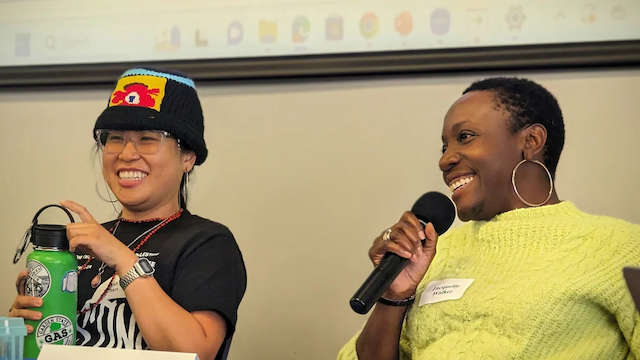
SUMMIT PANELISTS CHAVAYSHA CHANEY (BACKGROUND) FROM WOMEN FOR A HEALTHY ENVIRONMENT AND JAMIL BEY (FOREGROUND), DIRECTOR, PITTSBURGH DEPARTMENT OF CITY PLANNING
Not your typical summit: 3 days of healing and joy
The summit was anything but ordinary. During the three-day event, participants collectively reignited the region’s environmental justice movement. The sobering task was interspersed with celebration, joy, and healing activities on Thursday night in Homewood, with yoga, crafting, cooking, storytelling, and more.
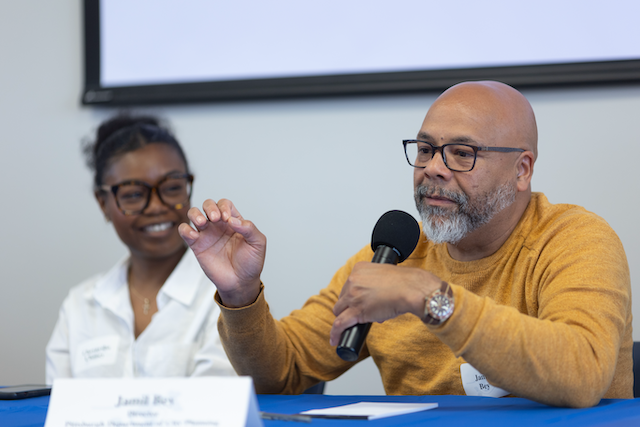
On Friday in the Hill District, summit keynote speaker Dr. Sacoby Wilson from the University of Maryland’s College Park School of Public Health, led a lively discussion about connecting and addressing injustices in housing, education, employment, and healthcare. Breakout panels during the day helped participants dive deeper.
In one panel for example, participants learned how the Black Environmental Collective, the Black Equity Coalition, and the University of Pittsburgh teamed up to fight COVID-19 health inequities. The group collected and distributed timely health data and research to county and state health departments and politicians. The model they created is now being used to fight other health inequities in the region.
In another panel, participants discovered how Oasis Farm and Fishery uses vacant land to grow food for communities that don’t have easy, affordable access to fresh fruits and vegetables. Community members help to decide what should be planted and can take free cooking and urban farming classes.
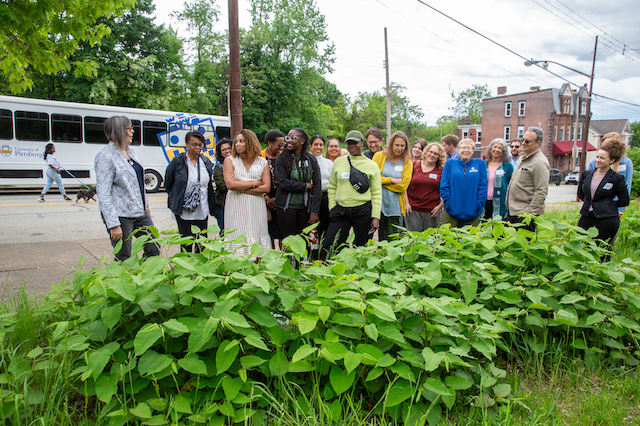
SUMMIT PARTICIPANTS TOUR A VACANT LOT IN THE HILL DISTRICT
Friday also featured a tour of vacant lots in the Hill District led by Pitt School of Law faculty members Stephanie Dangel and Jacquelin Walker. The discussion centered on the past, present, and potential futures of historic Wylie Avenue.
On Saturday, an event in Hazelwood included environmental storytelling as well as instruction on how to make healthy cleaning products. Some participants even made their own healthy beauty products.
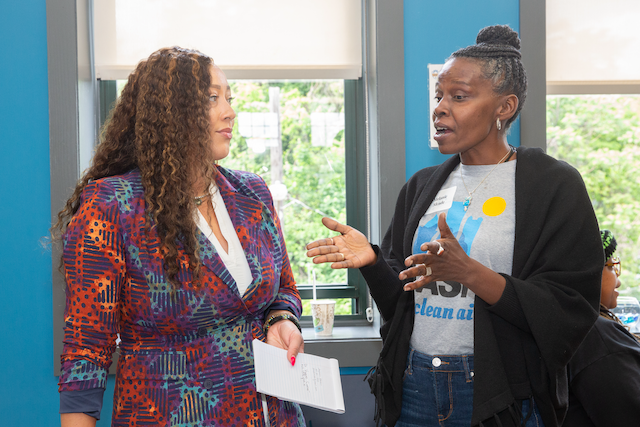
SUMMIT PANELISTS KYAIEN CONNER (LEFT), PITT FACULTY AND DIRECTOR OF THE CENTER ON RACE AND SOCIAL PROBLEMS AND MELANIE MEADE, CLAIRTON RESIDENT AND MEMBER OF THE BLACK APPALACHIAN COALITION
The summit’s conclusion was especially moving. Participants met in Clairton, a town fighting some of the country’s worst pollution. There, they joined Melanie Meade, lifelong Clairton resident and member of the Black Appalachian Coalition, and Adam Lobel, Guiding Teacher, One Earth Sangha, for a “bearing witness” ceremony that acknowledged the slow violence of environmental injustice on the land and its people.
Amplifying voices
“This first summit kicked off the power of community collaboration in healing one another and our environment,” explains Dr. Ndoh. “Now, the Black Environmental Collective is hosting follow-up conversations that will continue to spark ideas and action on behalf of overburdened and underfunded neighborhoods that need it most.”
